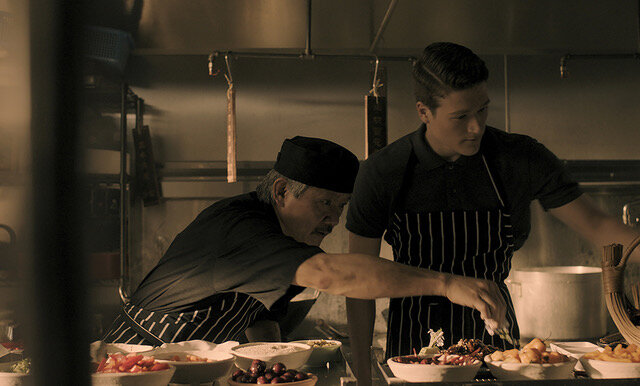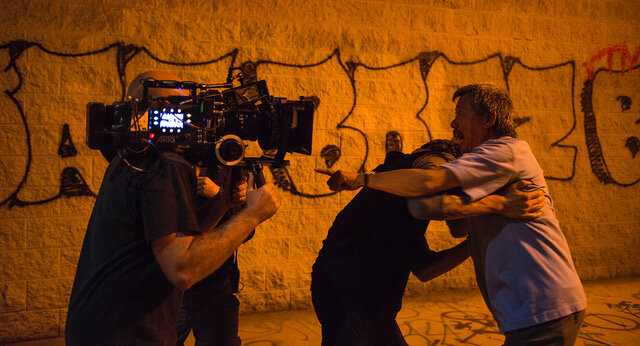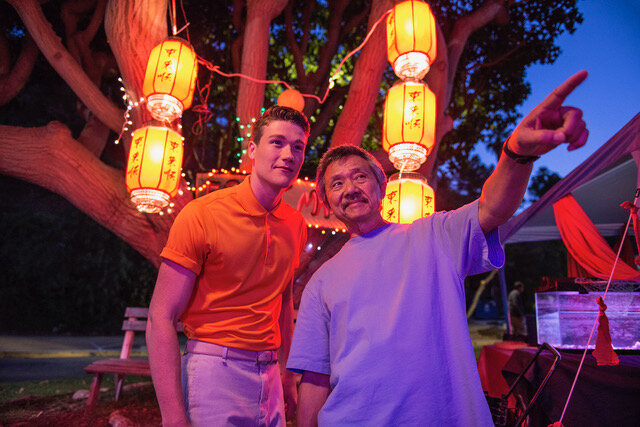INTERVIEW WITH HAO ZHENG AND LEQI KONG, NATIONAL STUDENT ACADEMY AWARD WINNERS
Hao Zheng is the Director, Leqi Kong the Co-Writer of THE CHEF, a sci-fi AFI Thesis Film that is a winner at the 2019 National Student Academy Awards. It has also won Best Futuristic Film at the AT&T Film Awards, has played at a the New Era Film Festival where it won Best Director, and at Jia Zhangke’s 86358 Short Film Festival, where it won the Grand Jury Prize. A full list of its awards is posted at the end of this article. Both filmmakers are graduates of AFI Conservatory in Los Angeles.
I was Hao Zheng’s Head of Directing and one of his teachers on the graduate directing program at AFI Conservatory in Los Angeles, where I also got to know and admire the work of Screenwriter Leqi Kong. I met them both in September in a coffee shop on the Sunset Strip, in the heart of West Hollywood, to ask about how they had come to learn filmmaking in the US and how this had advanced their understanding of film and storytelling. The coffee shop was buzzing throughout the afternoon but it was their conversation that sparked the most. Leqi was eloquent and entertaining as ever, while Hao, even after sixteen flights to and from different festivals in one month, was his customary engaging, incisive self.
PM: Why did you to come to America study to filmmaking?
LQ: I kind of changed my life and my career. In China I was a film translator. I translated multiple films and TV shows from all over the world, most of them from America, where it all started, where film is most received and has the most influence, and I realized I wanted to be a part of it, and I can speak both languages and could come there to see how they do things. I became a Screenwriter by doing this.
HZ: I went to high school in New York but before that I already knew I wanted to do film. So I thought I would have to go to Hollywood, even though I didn’t know exactly what Hollywood is. Mum loved Hollywood movies so I grew up grew up watching American films and I thought the only way to learn making films would be the US. Then the first year at undergrad [Emerson in Boston], I would be on set every weekend trying a different production position. I then realized what I needed — I was a very visual filmmaker but I had no idea how to tell a story. And I didn’t know how to convey emotion. But I was lucky as I was in Julian Higgins’ class (an AFI Directing alumnus and Winner of the Gold Award at the National Student Academy Awards), and in a class taught by AFI Producing alumna Marie Colabelli. Both of them told me to consider AFI. Then, at AFI, I became certain that this is what I want to do.
PM: What is it about THE CHEF that your education at AFI helped you to be able to do?
LQ: The education at AFI is for the most part about being inclusive, being collaborative. AFI has its own way of making films. There a million ways of making films but this is a right way, like the studio way. You have this much money. You have to report the budget to the school every couple of weeks, and you have to let everyone in every department know when you are changing the script. Every draft is so connected to everybody else. So AFI really prepared me for working with others in all aspects while we were writing the script. It adds to the difficulty of writing a draft but it also makes you more mindful.
HZ: I learned my weakness is writing, but I don’t have to do it alone. I can go to different people for help. I don’t have to do everything by myself.
LQ: Writing is a lonely process, but we had a team. You could ask people, like, what do you think should happen? You don’t necessarily need to take someone’s advice, but it prods your imagination.
HZ: With THE CHEF, and this is a good example, I’ve always tried to find opportunities to do something I hadn’t done before, like try different genres. I want to find my own belief system in their worlds. As long as you are truthful and your character-driven story is the core, which is emotional, then the film will move people. THE CHEF has proved this to me.
LQ: Part of our collaboration is in the same thing. Like, genre is like a coat you put on the story, which you still make truthful. I also try different kinds of stories. I have my comedy sample, I have the Sci-Fi of THE CHEF, I have my magical realism story. You don’t have to do only one thing.
PM: How do you see the differences in approach to storytelling in the US and China?
LQ: I never learned storytelling in China but I watched Chinese films of course.
HZ: I’m still trying to figure that out. Put it this way — I love to observe audiences when CHEF is playing here versus when it’s playing in China. It’s totally different everywhere. Here, people find it more comedic, and the sci-fi is not the main focus. They’re also focusing on the immigrants’ aspect of the story. In China, nobody cares about the immigrant story. Most people are interested in the sc-fi aspect. They don’t really respond to the comedic elements. Comedy is a genre that doesn’t really translate. When I first came to the US I watched some comedy and didn’t get it. After a few years I started to get comedies here and not get comedy in China!
PM: But you’re talking about audience sensibilities rather than storytelling.
HZ: Ah! For me, I don’t want to rush the storytelling. I want a slow-burn. The storytelling is much more patient.
LQ: That’s also my observation.
HZ: Everything here is very to the point. Fast editing and so on.
LQ: Asian storytelling is more like a mood, a vibe. Like vignettes of life.
HZ: It’s like conveying emotion through the tone rather than the story.
LQ: The reason is that there is so much going on in America. America is the melting pot. Like the front-line. You can see it as how people collide with each other. In China we don’t focus on conflict. We focus on, like, an echo almost, like a vibe, like a mood.
PM: In the west we had Aristotle [the Greek Philosopher] with his theory of drama and tragedy. That had a big effect.
HZ: In China we had our ancient poetry, always describing situations in nature rather than straightforward storytelling.
PM: That’s so interesting! How did you work together? As Director and Co-Writer?
LQ: It was a good collaboration. And we worked on two [AFI thesis] films. We once spent seven hours on a story meeting and basically acted it out. What’s happening in this scene? What if he does this? It’s a different process from me sitting by myself and thinking what’s going to happen. Hao is more of a visual guy.
HZ: I’ve never co-written with anyone else. I was very stressed with the first thesis [NEW YEAR’S EVE] because I changed the story. There were so many conflicts. I was worrying how I was going to do it so I approached Vanessa and she was willing to come onboard. Then we talked. I felt I was trying to learn both writing and how to collaborate with another writer.
LQ: Hao is a strong advocate of how every scene in itself has to convey the goal, the conflict, the drama. Even now I’m writing my own stuff and with each scene I’m thinking how important is this to the whole script?
[Here I talked about how a scene might work in other ways — to set something up, create suspense, or mesmerize the audience as Lee Chang-dong does in BURNING for example, when Hae-mi dances. But more of this another time].
LQ: I’m heavy on structure. I need to know where I’m going. I need to know where the end is, in order to start. Some writers enjoy not knowing where they are going. They let the characters take them to the end. I have to have a structure! But a Director like Hao can help cut me loose. Then I realize I can get out of my own way.
HZ: For me it was very important to have Leqi there the whole time. Her job didn’t end until after post-production.
LQ: I felt so appreciated!
HZ: Our DP Carlos Mendoza was very involved with the story too, and sometimes he would talk with Leqi and myself about it.
LQ: And our editor Guangwie Du also. It was great that everyone could express themselves.
PM: And there was producer and Co-Writer Ithaca Deng too!
PM: What advice do you have for young Chinese Filmmakers?
LQ: I’m still young myself!
HZ: I feel like there’s so much advice I want to give. If I were sitting with myself ten years ago I would give so much. One thing would be Don’t be afraid to try! In any competitive program some people will just want to show they are good, so they will play safe. But it is good to try new things. But also, and this sounds like the opposite, Be open to advice! You need to listen to suggestions but you also need to be sure what you really want.
LQ: I would say, have an opinion but don’t hold too fast to it. Maybe you didn’t see the whole picture so don’t be afraid to change your opinion. But you have to know what you want. You are making a film because you have something to say.
HZ: Oh! One other thing. Be patient! Everyone seems to be getting so much every day and you feel you’re so behind. But this is advice to myself in Hollywood. You need to take your time. Be really patient. Really work on your projects.
LQ: Yeah! THE CHEF is a really good example. We spent so much effort on it and we didn’t expect all of this success at all. It’s a long process!
THE CHEF AFI Conservatory Thesis Film. 2018.
Producer/Co-Writer: Ithaca Deng
Editor: Guangwie Du
Co-Writer: Leqi Kong
Cinematographer: Carlo Mendoza
Director: Hao Zheng
AWARDS
Student Academy Awards - Winner, Los Angeles, CA
AT&T Film Awards - Best Futuristic Film, Los Angeles, CA
86358 Short Film Festival - Grand Jury Prize, Shanxi, China
NEW ERA Film Festival - Best Director, Beijing, China
South Dakota Film Festival - Best Student Short, Best Actor, Life Achievement Award (for our
actor), Aberdeen, SD
SELECTIONS
Short Shorts Film Festival & Asia 2019, Japan
Show Me Shorts, New Zealand
Heart of Gold International Film Festival, Australia
National Film Festival for Talented Youth, Seattle, WA
CAA Moebius Screening, Los Angeles, CA
Dances with Films - Spotlight China, Los Angeles, CA
Victory International Film Festival, Evansville, IN
Golden Door International Film Festival, Jersey City, NJ
Emerge Film Festival, Lewiston, ME
Orlando Film Festival, Orlando, FL
LUSCA Fantastic Film Fest 2019, Puerto Rico



